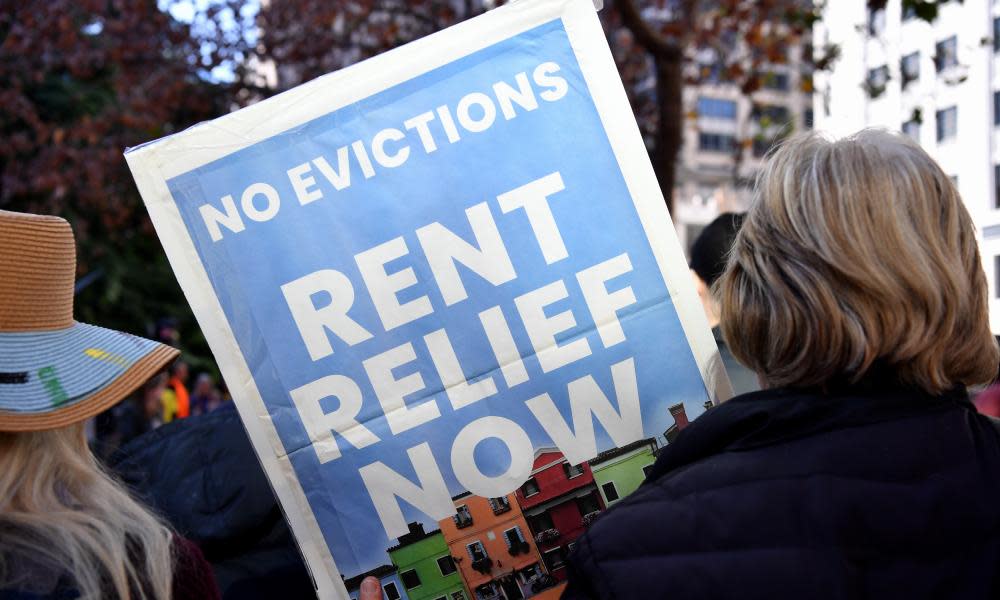NSW state budget: advocates criticise the ‘crumbs’ allocated to social housing

Housing advocates have criticised the New South Wales government for failing to provide meaningful funding and reform to get more homes built and reduce the social housing waitlist in its first budget.
The measures included in Tuesday’s budget have been described as “extremely disappointing” and amounting to “crumbs” when compared with the scale of need across the state experiencing a “chronic housing crisis”.
At the centre of Daniel Mookhey’s first budget was a scheme to reinvest $300m into the state-owned property development organisation Landcom to fund almost 5,000 homes over the next 15 years. About 1,500 were expected to be “affordable”.
“It is a publicly owned corporation. It has featured heavily in our housing past. It needs to feature prominently in our housing future, too,” Mookhey said.
“It is a jewel that wasn’t privatised and now we can show people what it can do.”
The pledge was part of a $2.2bn housing package that will largely be used to bankroll infrastructure projects including new roads and schools, and support new developments and densify parts of Sydney.
The budget papers also revealed the state’s booming property market will see stamp duty revenue increase, as people who delayed buying a home during the pandemic and inflationary period return to the market.
Landcom will also receive $60m for a pilot of publicly owned build-to-rent projects in regional NSW, as the government looks to rebuild the role the agency played in delivering homes.
A separate $224m package for social housing, including exploring modular homes to boost housing supply, was unveiled ahead of the budget.
The head of the state’s Community Housing Industry Association, Mark Degotardi, described the budget as “extremely disappointing” for people on a social housing wait list that this year hit 56,000.
“We wonder when the government is going to have the courage to confront the crisis,” he said.
“It’s a pretty underwhelming centerpiece, if it truly is the centerpiece of this budget.”
He said the government’s plan to deliver a handful of “affordable” homes by 2040 meant people in need would be left waiting, although he did support Landcom delivering homes.
The Committee for Sydney’s chief executive, Eamon Waterford, described the funding for Landcom as “very modest” when compared with the $10bn a year the thinktank estimated Sydney loses every year due to housing affordability.
“It’s absolutely the right question to be asking what role can the government play in delivering affordable housing and Lancom are the right people. I’d like to see more funding.”
Homelessness NSW said the social housing package “amounts to crumbs”, given the scale of the state’s problems.
“NSW does not need more vehicles for housing and homelessness finance, we need direct investment, now,” said the peak body’s acting CEO, Amy Hains.
“Social housing has suffered from decades of underinvestment.”
NSW has a shortage of 221,500 social and affordable homes, rents are hitting record highs and demand for homelessness services soared in the first three months of this year, Hains said.
The NSW Greens’ housing spokesperson, Jenny Leong, accused the government of using inflated housing prices to prop up a budget that provided little to renters and people living in housing instability.
Related: NSW Labor pledges $2.2bn for housing and infrastructure in first budget in a decade
“The state budget is entirely dependent on increasing house prices,” she said. “Pushing house prices up improves NSW budget position, the budget has been saved by the housing crisis – and yet who is ‘saved’ and who ‘pays’ for this incredibly cooked system?
“Renters are being hit hardest – as are those who are homeless or facing risk of homelessness.”
The NSW opposition leader, Mark Speakman, said affordability needed to be a “top priority” and that the number of houses slated to be built by Landcom was so low it was “a mirage”.
While many groups were critical of the housing spend, Business NSW’s CEO, Daniel Hunter, said the investments in “housing, regional NSW and the energy transition” would help businesses.


